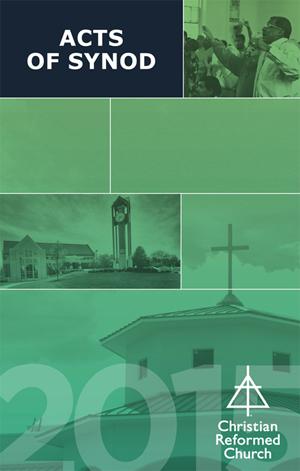
Synod 2015 and diaconal ministry
Dear Deacons:
This is a significant year for deacons in the Christian Reformed Church. The 2015 Task Force report approved some important principles for diaconal ministry in the 21st century. The report addressed the role of deacons in congregations and communities as well as the role of elders. And, Synod approved deacon delegation at Classis & Synod.
So, what’s up with deacons going to Classis & Synod? And, what’s up with the upcoming changes to the Church Order? I will try to summarize some of the more significant decisions. Please feel free to call DMC staff and Board of Directors if you have any questions.
- Both Deacons and Elders give leadership to distinctive areas of ministry. However, deacons and elders also have some common areas of ministry. (see changes to Article 12 & 25). “It is not simply that the church has deacons, but rather it is the case that the whole church is itself called to diakonia (works unto others)” (2013 Report page 4 & Ephesians 4:11-13). Deacons are important ministry leaders.
- Implication? Deacons are not to just perform diaconal ministry on behalf of the church, but to mobilize and equip the church to fulfill its calling.
- The proposed changes to the relationship of elders and deacons point to the importance of the two offices working together for the sake of God’s mission. The CRCNA agencies are committed to supporting our congregations to strengthen their missional and incarnational presence in our communities.
- Implication? Dialogue is needed at the Council level and Classis level meetings on how to strengthen the partnership of these two leadership roles. Contact DMC staff for suggestions.
- The 2015 Report was also guided by the ‘principle of parity.’ This parity is best demonstrated by diaconal presence in the major assemblies of the church. This is “not about equal representation but about the full representation of the whole church which these offices represent” (2015 Report page 329). For this reason, we recommend that each classis examine their agendas to reflect these new changes (see changes to Article 34).
- Implication? Diaconal involvement should be invited to shape agendas at Council and Classis.
At many classes across the country, deacons have already been included. But with the Church Order changes adopted by this synod, each church now needs to send an elder, deacon, and a minister to classis meetings unless “great distance or other weighty reasons” prevent them from doing so.
What implications will this have for your leadership role, your church, and the denomination as a whole? Together we hope to shape the answers to this question. So, let’s continue the conversation. Let us know how we can support you along in this journey at Classis or at your local church.
-written by Hans Kater, National Director, Diaconal Ministries Canada
for more on Synod 2015, click here



